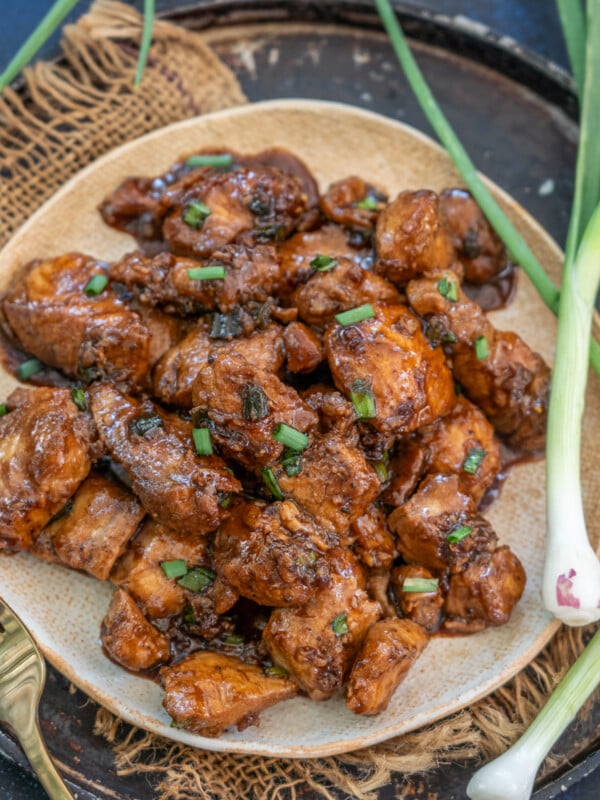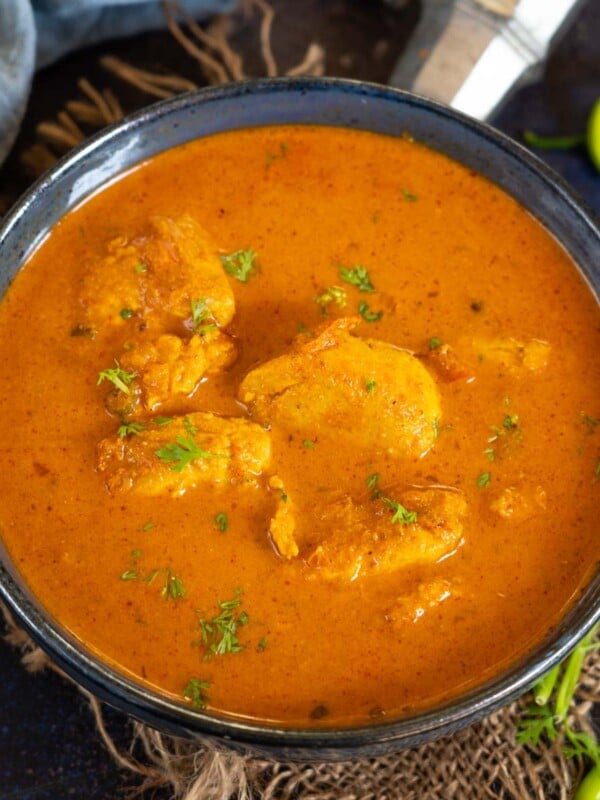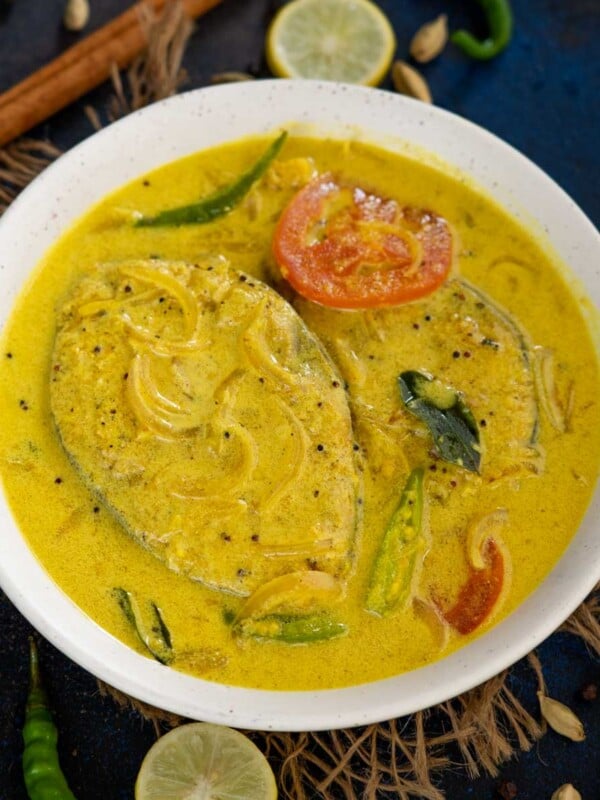Hibachi Salmon (Japanese Steakhouse Style)
This Japanese Steakhouse Style Hibachi Salmon is easy to make at home using simple ingredients. Serve it with Hibachi fried rice for a hearty meal.
Here are some more Hibachi-style recipes: Hibachi Ginger Salad Dressing, Hibachi Fried Rice, Hibachi Vegetables, Hibachi Chicken, and Hibachi Noodles.

Last week, we went to a Japanese steakhouse for dinner. The experience was great but super expensive. Call me cringy, but it pinches my heart to shell out this insane amount of money for something you can easily replicate at home.
I have already made many Hibachi-style recipes and shared them on this blog. They taste pretty close to the ones you get at these steakhouses. So, this time, I decided to try this Hibachi-style salmon recipe. Do try it and let me know if it tastes like your favorite Japanese restaurant or not.
About Hibachi Salmon
This Japanese Steakhouse-Style Hibachi Salmon is a breeze to make at home using simple ingredients in under 20 minutes.
Homemade Hibachi-style salmon tastes just like the one you get at Japanese restaurants like Benihana, Kyoto, and Kobe. The plus point is that you can adjust the recipe as you need. It is much more economical to make at home, too.
Hibachi Salmon is made by pan-searing Atlantic salmon fillets and coating them with a soy sauce-based tangy and savory sauce.
Enjoy it for a comforting Hibachi-style dinner with white rice, hibachi fried rice, or hibachi noodles and yum-yum sauce.
Ingredients
Salmon – I recommend using Atlantic pink salmon fillets about 1 inch thick. If you are using frozen salmon, thaw it thoroughly and pat it dry before using it.
You can use salmon fillets with skin on or off. If not salmon, you can use any boneless fish in this recipe.
Cooking Oil – I used a combination of toasted sesame oil and extra virgin olive oil, which is popular in Hibachi cooking.
Feel free to use any cooking oil of your choice.
Garlic & Ginger – Fresh ginger and garlic oomphs up the taste of this simple dish.
Soy Sauce is a must-have ingredient in Hibachi cooking. You can use low-sodium soy sauce if you wish to.
Replace soy sauce with tamari for a gluten-free Hibachi salmon dish.
Cooking Wine – The addition of cooking wine intensifies and enhances the flavors of other ingredients. You can replace it with white wine vinegar or rice vinegar.
Black Pepper – Freshly ground black pepper is preferred.
Lemon Juice – It brings all the Hibachi flavors together and adds freshness to the recipe. Make sure to use freshly squeezed lemon juice.
You can replace lemon juice with lime juice.
How To Make Hibachi Salmon
Rinse 2-3 salmon fillets (5-6 oz each, skin on or off) and pat them dry using paper tissues. Patting the fillets is important to remove any extra moisture. Otherwise, the salmon will steam and become soggy.
You can also cut the fillet into small pieces instead of keeping them whole.
Heat a non-stick pan over medium-high heat.
Add 1 tablespoon sesame oil and 1 tablespoon extra virgin olive oil to the pan.

Once the oil is hot and shimmery, place the salmon fillets in a single layer and sear for 4 minutes.

Flip gently using a pair of tongs or a fish spatula and cook the second side for another 3-4 minutes.
Don’t overcook. The salmon flesh should still be some pink, as the fish will continue to cook when removed from heat.

Transfer the filets to a plate and keep them aside.
Reduce the heat to medium.
Add 1 tablespoon minced ginger and 1 tablespoon minced garlic to the same pan and saute for 15-20 seconds.

Add the following ingredients to the pan and cook for 10-15 seconds, stirring continuously.
- 2 tablespoon soy sauce
- 2 tablespoon cooking wine
- 2 tablespoon freshly squeezed lemon juice
- ¼ teaspoon freshly ground black pepper

Transfer the salmon fillets to the pan and coat them with the sauce on both sides.

Transfer the fillets to the serving plate and pour the remaining sauce. Serve hot.

Frequently Asked Questions
Yes, sure, you can. Use any fish fillets of your choice. Cod, haddock, maceral, trout, etc., all work great.
The salmon fillets are cooked through when they flake easily with a fork and are no longer translucent in the center. The internal temperature should reach 145°F (63°C).
Serving Suggestions
At the restaurants, Hibachi Salmon is served along with a mound of Hibachi Fried Rice and some Hibachi Zucchini or Hibachi Vegetables on the side. Everything on the plate is generously drizzled with Yum Yum Sauce, which elevates the taste of the meal.
You Might Also Like
Global Snacks/ Appetizers
Fish Fingers
Main Course
Honey Garlic Fish Recipe
Fish & Seafood Curries
Fish Molee Recipe (Meen Moilee)
Craving more? Subscribe to Whisk Affair to get new recipes and a newsletter delivered straight to your inbox! And stay in touch on Facebook, Pinterest, and Instagram for all of the latest updates.

Hibachi Salmon Recipe (Japanese Steakhouse Style)
Ingredients
- 2-3 salmon fillets (5-6 oz each, skin on or off)
- 1 tablespoon toasted sesame oil
- 1 tablespoon extra virgin olive oil
- 1 tablespoon minced garlic
- 1 tablespoon minced ginger
- 2 tablespoons soy sauce (use tamari for gluten-free)
- 2 tablespoons cooking wine (or rice vinegar or white wine vinegar)
- 2 tablespoons freshly squeezed lemon juice (or 1 tablespoon lime juice)
- ¼ teaspoon freshly ground black pepper
Instructions
- Rinse salmon fillets and pat them dry using paper tissues.
- Heat a non-stick pan over medium-high heat.
- Add sesame oil and extra virgin olive oil to the pan.
- Once the oil is hot and shimmery, place the salmon fillets in a single layer and sear for 4 minutes.
- Flip gently using a pair of tongs and cook the second side for another 3-4 minutes.
- Don’t overcook. There should still be some pink in the salmon flesh, as the fish will continue to cook when removed from heat.
- Transfer the filets to a plate and keep them aside.
- Reduce the heat to medium.
- Add ginger and garlic to the same pan and saute for 15-20 seconds.
- Add soy sauce, cooking wine, lemon juice, and black pepper to the pan and cook for 10-15 seconds, stirring continuously.
- Transfer the salmon fillets back to the pan and coat them with the sauce on both sides.
- Transfer the fillets to the serving plate and pour the remaining sauce over them. Serve hot.




